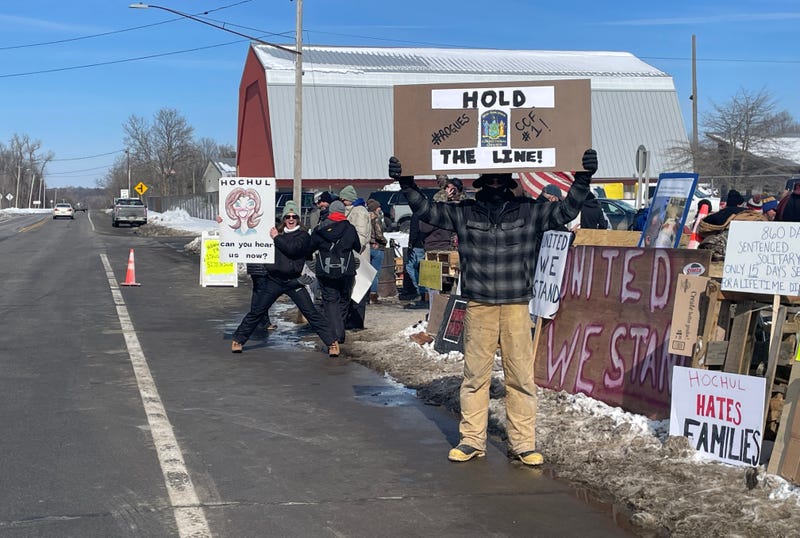
Buffalo, N.Y. (WBEN/AP) - In, what could be, a breakthrough that will end the ongoing wildcat strikes by corrections officers at prisons across New York State, a consent award (read the complete consent award below) is now before officers for their review.
"We have just concluded the final day of mediation to resolve the ongoing strike," a document circulated to officers and obtained by WBEN reads.
The workers must return to work by Saturday to avoid being disciplined for striking, mediator Martin Scheinman in a seven-page memo detailing the agreement, known as a binding consent award.
The deal includes changes to address staffing shortages and provisions to minimize mandatory 24-hour overtime shifts
Among the terms in the agreement, HALT-related programming will continue to be suspended for 90 days, and if staffing levels fall below a certain threshold, HALT-related programming will cease for that day. The National Guard will also remain on site to help stabilize facilities as officers return to service.
The New York State Correctional Officers and Benevolent Association (NYSCOPBA) is urging members to closely review the document, and is urging membership to accept it and return to work. The document will not be subject to a vote, as the strike was not sanctioned by the union.
"As your union, we must strongly encourage you to end the strike and return to work," union leadership said to officers late Thursday said.
Corrections officers will make their determinations individually and decide when to return to work in the prisons.
Hochul said the mediated settlement addresses many of the workers’ concerns, puts the state prison system on the path to safe operations and prevents future unsanctioned work stoppages.
“My top priority is the safety of all New Yorkers, and for the past 11 days, I have deployed every possible State resource to protect the well-being of correction officers, the incarcerated population and local communities across New York,” Hochul said in a statement.
The union, the New York State Correctional Officers & Police Benevolent Association, Inc., did not immediately respond to a message seeking comment.
Strikers won several key concessions, including a temporary bump in overtime pay, a potential change in pay scale and the suspension of a prison reform law they blamed for making prisons less safe.
For the next month, under the agreement, overtime will be paid at a rate of 2½ times instead of the usual 1½ times regular pay. The state also agreed that within the next four months it will finish its analysis of a union request to bump the salary grade for officers and sergeants.
The reform law, which limits the use of solitary confinement, will remain suspended for 90 days while the state evaluates if reinstating it will “create an unreasonable risk” to staff and inmate safety.
The state and union also agreed to form a committee to study staffing and operational inefficiencies at each facility in an effort to relieve strain on existing staff.
Corrections officers began walking out Feb. 17 to protest working conditions. Hochul deployed the National Guard to some prisons to take the place of striking workers. The job action violated a state law barring strikes by most public employees. Several inmates have died during the strike.
Martin Scheinman, a seasoned mediator who serves as the permanent arbitrator for Major League Baseball, the National Hockey League and their unions, said the sides demonstrated “good faith and enormous commitment to finding workable solutions for the workforce."
“What has become clear during the mediation is the relationship between the parties and the workforce is strained,” Scheinman wrote in a memo explaining the agreement. “No single issue, law, or policy entirely explains the current situation. It is obvious this erosion did not happen all at once.”
Read Complete Mediator Memo and Consent Award
Martin Scheinman, a seasoned mediator who serves as the permanent arbitrator for Major League Baseball, the National Hockey League and their unions, said the sides demonstrated “good faith and enormous commitment to finding workable solutions for the workforce."
“What has become clear during the mediation is the relationship between the parties and the workforce is strained,” Scheinman wrote in a memo explaining the agreement. “No single issue, law, or policy entirely explains the current situation. It is obvious this erosion did not happen all at once.”
